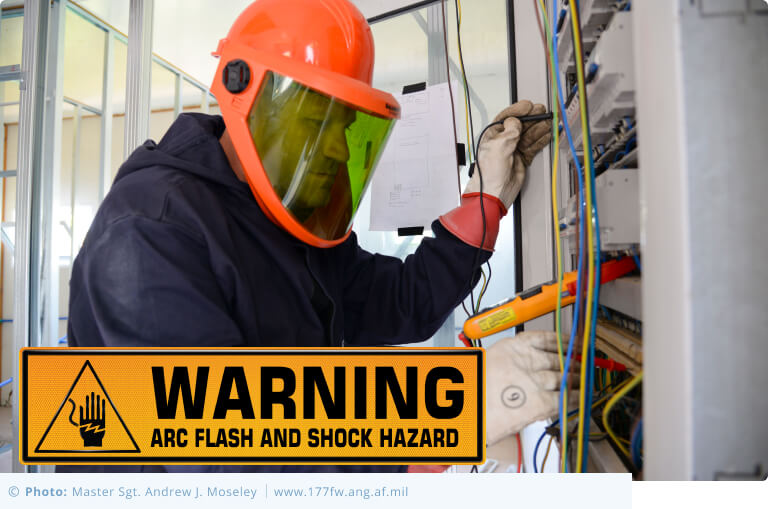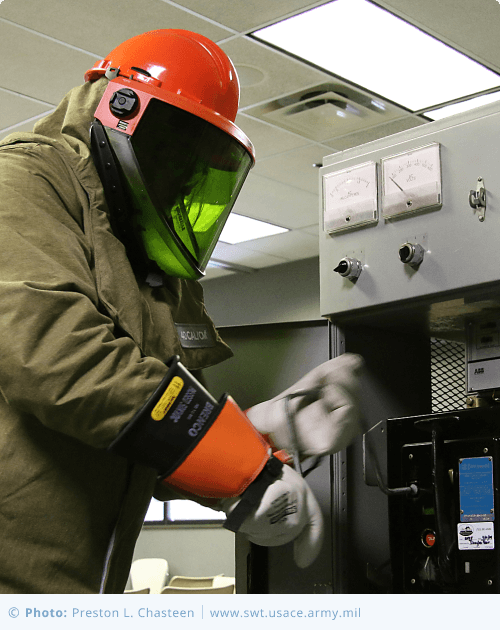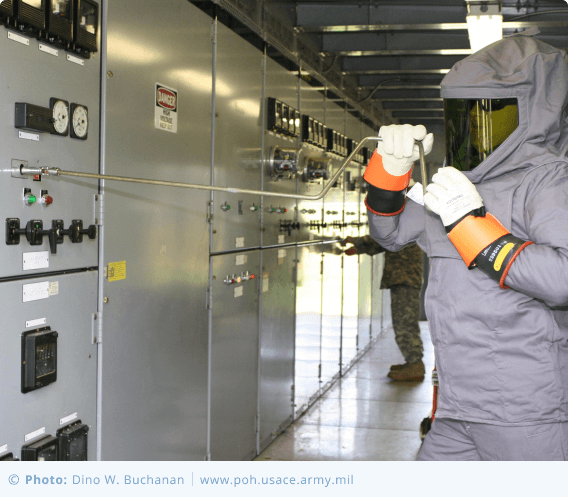Online Arc
Flash Training
NFPA 70E (2024) Compliant in Just 2 Hours
Expert-led by Doug Baucom, P.E., this arc flash safety training is fully accredited, 100% online, and designed to meet the latest NFPA 70E standard for electrical safety in the workplace.
Key Benefits:
- 2-hour, self-paced format
- 4 CEU credits (NCBEEC)
- Personalized certificate
- English & Spanish language options
- Real arc flash event footage included
Arc flash incidents are one of the most dangerous electrical hazards in the workplace. They can cause life-threatening burns, hearing loss, and catastrophic damage in a fraction of a second. With the right NFPA 70E safety training and safe work practices, these arc flash hazards are often preventable.
Arc flash incidents are among the most dangerous electrical hazards in the workplace — and they happen more often than most people realize.
- Every day in North America, workers are injured, hospitalized, or killed by arc flash accidents.
- An arc flash can generate heat hotter than 35,000°F, with sound blasts reaching 140 dB and explosive pressure exceeding 2,000 psi.
- The average treatment cost is $1.5 million, and total damages from a single event can reach $30 million when you factor in equipment, litigation, and lost business.
With the right NFPA 70E safety training and consistent safe work practices, most arc flash hazards are entirely preventable.
Flash?
Usually Occur?
Be Prevented?
Flash?
What Is an Arc Flash?
An arc flash is a sudden release of electrical energy through the air, often between conductors or from a conductor to the ground. Temperatures can exceed 35,000°F, hot enough to melt metal and ignite fires instantly. This makes arc flash safety essential for every electrical worker.
Arc flash events often happen when:
These situations put electrical workers at serious risk and greatly increase the chance of a life-threatening incident.
- 2-hour, self-paced format
- 4 CEU credits (NCBEEC)
- Personalized certificate
Usually Occur?
How Does Arc Flash
Usually Occur?
Arc flash can strike in many different situations when handling, maintaining, or working near electrical equipment. Whenever electricity escapes its intended path, the results can be explosive. On job sites, the risk increases when systems are energized, poorly maintained, or when workers lack proper arc flash training.
Arc flash events often happen when:
- Electrical wires are not properly insulated
- Dust or corrosion builds up on electrical systems
- Human error occurs due to lack of arc flash training
These situations put electrical workers at serious risk and greatly increase the chance of a life-threatening incident.
Be Prevented?
How Can Arc Flash Be
Prevented?
Most arc flash incidents are preventable. Following safe work practices, using proper PPE, and completing an NFPA 70E safety course will drastically reduce the risk of injury. Our arc flash safety course gives you the proven methods to stay safe and comply with electrical safety regulations.
Arc flash events often happen when:
- 2-hour, self-paced format
- 4 CEU credits (NCBEEC)
- Personalized certificate
These situations put electrical workers at serious risk and greatly increase the chance of a life-threatening incident.

See the Training in Action
Watch Doug Baucom, P.E., deliver arc flash safety essentials in a clear, concise way. This preview shows how the course prepares electrical workers to meet OSHA part 1910 subpart s electrical requirements and safety standards.
About the Training Our arc flash safety course is designed for busy professionals who need the certification fast.

Our arc flash safety course is designed for busy professionals who need a certification fast. It applies to those who work on everyday electrical tasks and high voltage systems, ensuring all workers receive the training required for compliance.
- Length: 2 hours, self-paced
- Format: 100% online, accessible anytime
- Compliance: Meets thelatest NFPA 70E standard for electrical safety in the workplace (2024 Edition)
- Accreditation: 4 CEU credits (NCBEEC)
- Certificate: Personalized and printable
- Languages: English & Spanish
- Includes: Real arc flash event footage + interactive arc flash boundaries exercise
- Meets OSHA training required guidelines and industry safety standards

What You Will Learn This arc flash course covers the most critical topics to prevent incidents:
- Understanding arc flash hazards and approach boundaries
- Selecting and using PPE correctly
- Lockout/Tagout procedures
- Electrical safety & protective devices
- Recognizing warning signs of electrical hazards

About the PresenterDoug Baucom, P.E., is a licensed electrical engineer with over 30 years of experience in electrical safety training. He has trained thousands of electrical workers in the US and Canada, helping them comply with safety standards and work confidently around electrical equipment.

what others are saying
James R. – Control Systems EngineerDoug (Baucom) is an outstanding instructor. So his training courses are quite effective. I found the online version of it was good, specifically because anything he covers in class, he covers online. Doug is just simply – he’s a very experienced engineer. He always keeps up with the rules and regulations and he’s always on top of it.
Robert N. – Maintenance ManagerI think he’s (Doug Baucom) very good at what he does. He keeps you engaged. He gives you good information. Everybody that took it was very pleased taking the class both times we took it. The people who took the online class had a similar experience.
Enroll Today and Protect Your Team from Arc Flash Hazards
Yes. Our online arc flash training meets OSHA's part 1910 subpart s electrical requirements and follows the latest NFPA 70E standard for electrical safety in the workplace (2024 edition).
The arc flash safety course is designed to be completed in just 2 hours, including quizzes and the final exam. It’s self-paced, so you can start and stop anytime.
This arc flash course is ideal for electrical workers, contractors, safety managers, and maintenance teams to fulfil the training required for OSHA compliance.
You’ll receive a printable certificate and 4 CEU credits (NCBEEC) to document your electrical safety training.
Yes. The NFPA 70E course is fully available in both English and Spanish.
Yes. We include real arc flash hazards footage and follow-up incident photographs to show the reality of arc flash safety and reinforce safe work practices.


